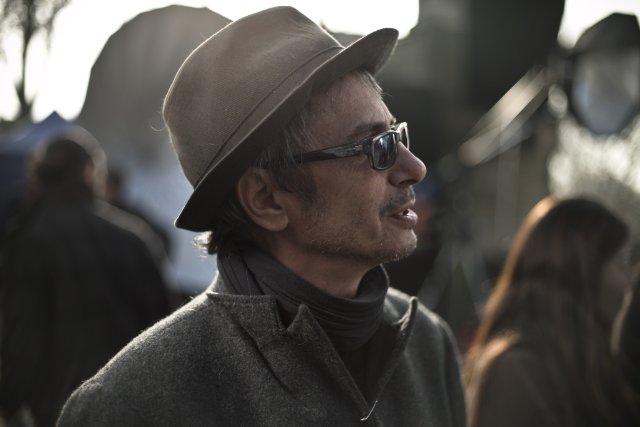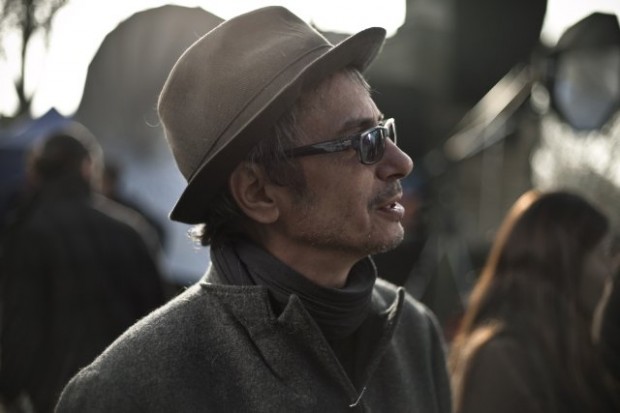
One of the most intriguing films to come out of the New York Film Festival this year was Leos Carax’s Holy Motors. The French filmmaker who hadn’t made a film in nearly a decade returns with an operatic experience that is full of mystery and wonder. The narrative is broken down into nine chapters each involving a chameleon like performance from Carax regular Denis Lavant that results in an almost cinematic comic book. While the themes Carax touches on vary from scene to scene, what keeps the viewer glued is an evolving atmosphere of the unknown and relishing in the joy of the unexpected. Such was the case when I sat down with the notoriously press shy director during a round table interview, yielding answers almost as surreal and mysterious as the film itself.
What inspired the concept of Holy Motors?
Leos Carax: I invented a kind of science fiction world to make it possible to see, or at least I hope, the whole experience of being alive today in one day instead of the more classical narrative form with time and flashbacks. The film was not born out of the idea of trying to tell cinemas history or talk about film genre. I use cinema as language to create the science fiction world but hopefully the film is not about cinema.
You’ve said that you wrote this script in a rage after other projects fell through. Can you talk about the writing process and this ‘rage’ you had?
I think the rage is what maybe made me go back to basics. All the projects I had were outside of France and in French, because I was sick of France. But I couldn’t make these films except for my little film I made in Tokyo. I used this experience in Tokyo, which was basically shoot digital, fast with Dennis Lavant and watching the dailies transposed that. I thought this is how I’m going to make this film, it’s the only way to make it fast and in Paris because it’s still simpler for me to find money there than any place else. I wouldn’t say I wrote it fast, I imagined it fast because I don’t write scripts, really. Then it, because it was imagined in that rage and in a quick way, it was probably the most unconscious film I ever imagined. I felt that watching dailies also helps in that sense, you don’t react to what you’re doing, you just do it. So the film becomes like a tunnel, you have to go through it. Now I almost regret playing the part in the beginning.
At first I was supposed to play that part and play the part that Michel Piccoli plays also, but I didn’t do that because I thought, ‘OK people are going to think he’s a director.’ Well he’s not a director, he’s like the boss of the invisible cameras or he’s like a mafioso or dictator but he’s not a director. He’s closer to a producer. And I was clearly not conscious of that decision. I’ve read things like a director waking up who after a long time of not making any films. You know my films start with images, a few images and a few feelings and I try to edit them together to see the correspondence between these images and these feelings. And one image I had was this kind of dead public, a faceless audience. I don’t know if they are sleeping or dead, so I used that as a prologue, because I always have prologues in my films where the image that sticks with me while I imagining the whole film is going to be the prologue. It doesn’t always make sense at the time I’m doing it, but I usually find it does by the end of the editing.
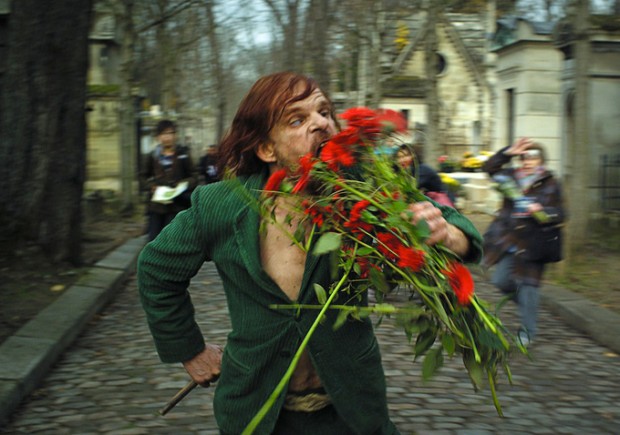
Was Holy Motors inspired by any of your other movies?
No. I mean, I got to see my films again but they live some place inside my head, probably. The only conscious, I mean I hate references obviously but other people see it in my films, but the only reference I knew I was using from one of my films is the motion capture the scene when Denis is running, which was close to a scene I had done in Mauvais sang, my second film. When he dances to a David Bowie song, except I was doing it on a treadmill with a virtual black background. Because the film is around this experience of being alive today, it’s also about real action, not fake action. How much do we still want to experience stuff, do we still want action? Do we still want to take responsibility for all lives and what we do? We filmmakers, but people in general, are lacking courage. So we have to find a way to be get courageous again, probably we should give kids in school courage lessons. Learn their physical courage, poetic courage and it seems we all lacking that.
How much of the film is about performance for performance’s sake or performance in life?
Well, I think I would call it experience again. I mean obviously cinema started there, started with the human body or an action. We always have and we still love to watch human bodies in action. We also love to watch landscapes or things we have created like buildings, cigarettes, guns, cars; but above all we love to watch human bodies. Whether they are running, walking, fucking, anything. So I imagined a world where machines and animals to invent a kind of solidarity against the virtual world. Because I mentioned that, when I was editing the motion capture scene I thought this is like Chaplin in Modern Times when he’s stuck inside the machines. Except there’s no more machines, it’s invisible. Another difference also is that he’s completely alone, he can’t go in the street with co-workers and fight the system or fight the machines or the people behind the machines. Solitude is troubling.
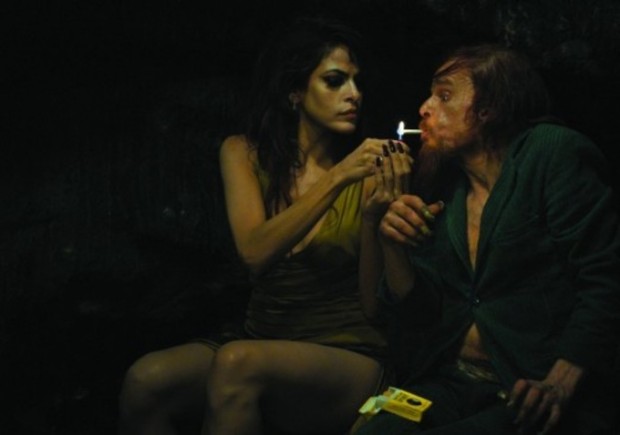
Is Holy Motors a reflection on the loss of film compared to digital cameras?
Hopefully the film can be seen by anybody that doesn’t know what cinema is, or cameras are, because I don’t really care about all that. We always are mutants and so we always have to adapt. Although I do feel that it’s going faster now so we have to adapt in ways nobody else has had to adapt in generations before. Doesn’t have to be bad thing, it can be exciting if you fight. It’s not about nostalgia. I do have a love for machines but cinema as an art, is the only art that had to be invented. So it’s a miracle it exists, it’s an invention. To survive cinema has already gone through different changes, though I do think digital is the most extreme. I mean people committed suicide when it went from silent films to sound, mostly actors. Some directors couldn’t make films anymore. So, it did not happen yet with digital cameras but the fact is I don’t know how interesting that is. These cameras were imposed on us, they’re not ready. They’re imposed like labs imposed medicines for sicknesses that don’t really exist. So I don’t see why it should be imposed, that doesn’t work well and nobody knows how to deal with them. Nobody knows how to project these films, but I had no choice. I haven’t made a film in, I don’t know how many years, so I adapted.
What are the forces operating, that the film is describing, to be resisted for the sleeping audience?
You can wonder in front of what film they are. Are we the film? I mean viewers. Films being born of images and feelings, I think there are two feelings that co-exist in the film, almost opposite feelings. One is the feeling of being tired of oneself, which can happen to any of us or has to happen to all of us, at least a few times in life. And also the feeling that you have no choice but to reinvent yourself at times in your life. If you want to survive you cannot go on. Maybe it was possible a long time ago, that someone could have the same life. It’s becoming more and more possible. If you want to live in the island that’s called cinema, that’s part of your job. I cannot make a film that the film industry has made before. Sometimes I use this courage I talked about earlier as a survival.

Is the transformations of Denis Lavant’s character Oscar a metaphor for the transformations an artist must go through to survive?
In this world of science fiction, I invented a job. Mr. Oscar’s job which doesn’t exist exactly in our world, to show this experience of living in the now. I’m not especially interested in actors or their lives, and their double or triple identities. I’m interested in these themes in real life. Hopefully the concept of the film is a sharper way to show that in one day, without using flashbacks or transport narrative. Sorry I’m a bit vague, I’m vague in French too but more vague in English.
Why did you initially decide to cast yourself in the role of the dreamer in the beginning?
Well, first there was the image I talked about, the public. And then my Yekaterina Golubeva who is the actress in Pola X told me about a short story by Hoffman and so I read the short story. It’s a man in a hotel room and he finds a secret passage to an opera house. So he goes there, and he sees an opera and falls in love with a woman, I thought this was a brilliant idea. It reminded me of something Kafka wrote ‘There’s a door in my apartment I have never seen before which could be the prologue to any film. So I thought that’s how I made the transformation from the opera into a theater. And when I wrote it I just called the guy Leos Carax, didn’t have an idea of how to call him, and then I played him. I didn’t really think about it. I remember thinking I want him to have a dog, I have a dog. My dog wouldn’t play with anybody else, he would follow me but he wouldn’t follow someone else. It started like that. The next shot after you see me in the theater, is I’m watching the film that is off screen but the next image is my daughter. I wanted her to be in the film so much, and that I was the one watching.
Music plays a big role in all your films. How did you decide on the soundtrack and how was working with Kylie Minogue?
Music is the biggest ambition. I think I would of loved a life in music over anything else. I would like to make a film one day that would be entirely music. I feel like it’s never been done right, really. The power of music, the energy of music, the beauty of it. I mean obviously music is used a lot in film but it’s used in a kind of obvious way. Like editing, if you have a rock song you’re going to edit with a lot of cuts and you have a slow long you’re going to not. It’s very basic. I’ve always played a lot of music in my films, I mean some films. So I had this idea for a scene in this department store that is near the river in Paris. One of the most famous historical department stores. We had rebuilt on the set of my film The Lovers on the Bridge years ago, filmed in the inside. But they closed a few years ago, it was bought a big luxury fashion group to build a luxury hotel. It was a popular department store so it was kind of a scandal. And because it was a scandal nobody could go in for the last 6 years.
They couldn’t go in, they destroyed the inside but they couldn’t destroy the staircase because it was classified, art deco or whatever. I really wanted to go inside and I even imagined making the whole film inside. So I knew it was going to be Denis Lavant, Mr. Oscar, and a lover, an ex-lover he hadn’t seen for a long time. And they would have very little time because they each had a job to do. And that’s when I thought of a song, because again I couldn’t use flashback in this narrative, it had to all happen naturally. I thought a song can tell a lot in 3 minutes. So I wrote the lyrics and then I was looking for someone, to sing and act the part of the woman. I asked Bowie, but Bowie is obviously not working right now. How did Kylie come there? I didn’t know anything about Kylie Minogue except the name but I had a project in London a few years ago and someone had mentioned her for the part. So I remembered that and I asked to meet her. Instead of all the make-up and glitter, she was very pure and she would be good for the part.
How is editing important to your process?
I love editing, that’s music. I feel like a composer there. I used to start editing two weeks after the beginning of the shoot. But now since I don’t like seeing the dailies, I do it later. But I’m there everyday, I’m there all the time. I have the same editor since my second film, Mauvais sang, her name is Nelly Quettier. This one was probably the hardest film to edit because the idea of the film is quite strange. The violent thing that happens when you edit is that you realize that people are going to see the film one day.
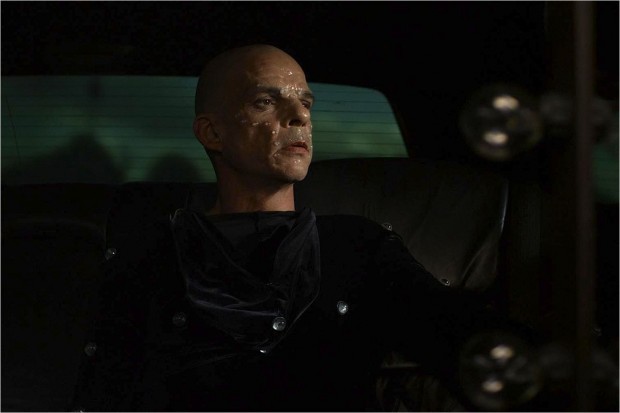
Holy Motors is now in limited release.

